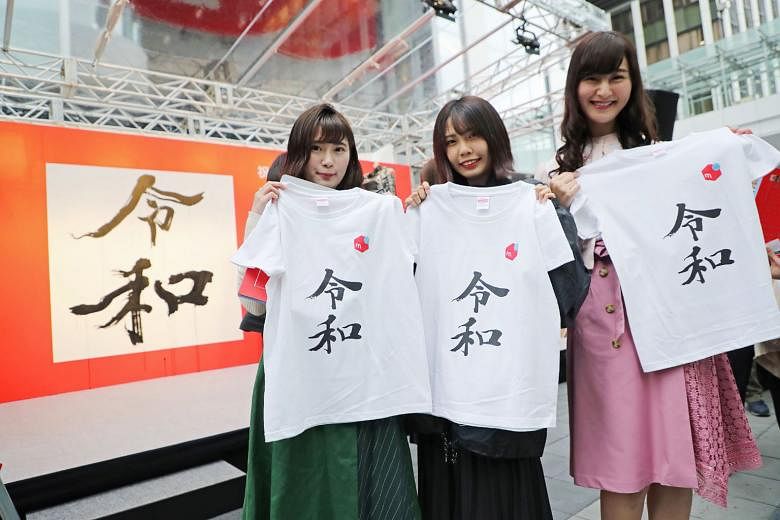Three in four Japanese people approve of Reiwa, the name of the new era that will begin on May 1, with Crown Prince Naruhito's accession to the throne, a media poll has said.
Businesses, meanwhile, are cashing in on the buoyant mood with new products and campaigns.
Snack maker Calbee reportedly intends to introduce a new "lightly salted" flavour of potato chips in time for the imperial handover on April 30, when Emperor Akihito, 85, steps down, bringing the curtain down on the Heisei ("achieving peace") era.
Other products that have either been rolled out or are in the works include pancakes, chopsticks, foldable fans, T-shirts, sake cups and even a board game.
Reiwa, which Tokyo said on Tuesday should be translated as "beautiful harmony", is the 248th gengo, or era name. It is the first to be drawn from a Japanese source as opposed to a Chinese literary classic.
The name was selected over five others: Eiko (loosely translated as "vast glory"), Koshi ("great arrival"), Kyuka ("eternal virtue"), Banna ("perfect harmony") and Banpo ("complete safety").
For Reiwa, its Chinese kanji characters "rei" ("auspicious") and "wa" ("peaceful") were drawn from a passage in the 8th-century poetry anthology Manyoshu (Collection Of Ten Thousand Leaves).
It is about the resilient plum flowers that withstand the harshest of winters to blossom in the auspicious dawn of spring.
Publishers have commissioned reprints of the original work, as well as expert analyses into the source material, as these fly off the shelves at bookstores such as Kinokuniya and Tsutaya following Monday's announcement of the name.
Reiwa is thought to have been proposed by Kyoto-based Japanese literary scholar Susumu Nakanishi, 89, professor emeritus at the International Research Centre for Japanese Studies.
Tokyo has highlighted the significance that a native source has been tapped for the first time.
"Although Japan was under the influence of Chinese civilisation for a long time, Japan has nurtured its own unique culture over thousands of years," Defence Minister Takeshi Iwaya said on Tuesday. "It's very significant that the (era name) was chosen from a Japanese text."
The specified Manyoshu passage is said to have been inspired by a poem written by Chinese polymath Zhang Heng, who lived from 78-139AD.
"Building up one's own gengo system was a symbol of national independence. Successive Chinese dynasties have forced countries under their jurisdiction to use the Chinese gengo system," said the editorial of the conservative Sankei newspaper on Tuesday.
On the same day, an editorial by the China Daily newspaper said no matter the media hype, it will be "alarmist" to see this as an attempt at de-Sinicisation.
Despite the conservative leanings of Prime Minister Shinzo Abe's government, it said: "It is not worth making a fuss over Abe and his colleagues wanting to highlight a more Japanese identity, although some Chinese may feel slighted that the tradition of naming a new imperial era by drawing inspiration from Chinese literature has been broken."
It added, noting that Tokyo has been seeking to improve ties with Beijing: "It would be wrong to read too much into the break with tradition... and view it as a change of approach by the Abe administration."
Still, the name Reiwa caused brief confusion among the Japanese before the use of "rei" was explained.
The common meaning of "rei" is "order" or "command" and some in Mr Abe's own Liberal Democratic Party have been caught by surprise.
Former secretary-general Shigeru Ishiba reportedly said: "Everyone was like 'What?' when they saw it was the 'rei' from 'meirei' (order)."
Dr Masaharu Mizukami, a scholar in Chinese and Japanese literature at Chuo University, told the Japan Times that "rei" has a history of being screened out of era names owing to its authoritarian implications.
The Mainichi Shimbun said in an editorial on Tuesday: "The selection of Reiwa as the next era name apparently reflects conservatism pursued by Prime Minister Abe. However, it is the Japanese public that will attach special meaning to Reiwa."
Mr Abe sought to quell such speculation: "People may not be that familiar with it, but 'rei' also has a good meaning as in 'goreijo' (the polite form of 'your daughter'), 'goreishitsu' ('your wife') or 'goreisoku' ('your son')."

